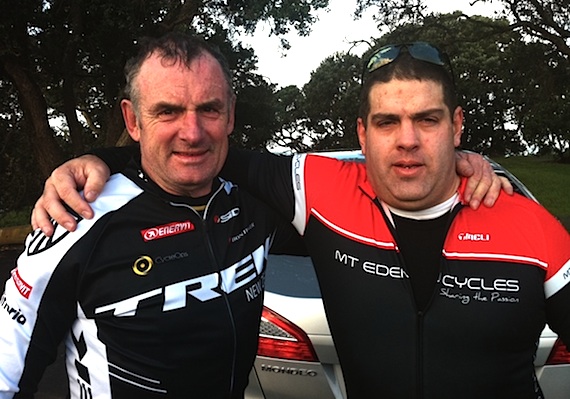
2011: Mallard wins the race in the real world. Slater simply not fast enough to live up to his own trash-talk. (Pic: Peter Aranyi) – click for link
Apparently attack-blogger Cameron Slater is considering appealing a recent court judgement denying him a journalist’s conditional protection of sources.
The ‘whale oil’ blogger, with close links to the National government including his pick for next leader of the Party, Justice Minster Judith Collins, is facing trial next year accused of defaming an Auckland businessman through a protracted series of negative and abusive posts published on his [apparently] widely-read website.
Many of the posts (since removed) published email communications and other business documents Cameron Slater says were supplied to him on a computer hard drive. The businessman claims the hard drive was stolen, although that is disputed. While not absolutely proven, it’s claimed in court papers (and it seems possible, if not likely) that the hard drive was provided to the blogger by one or more former business associates of the target. It’s also claimed he met with the sources: “The meetings were held for the purpose of collating and providing information for the Whaleoil Website”, documents before the court claim. (see: scoop.co.nz PDF)
What’s unclear (and we’ll get to it below) is whether Cameron Slater carried out the systematic campaign of published attacks on the businessman as a commercial venture (i.e. remunerated in some form by the businessman’s estranged former associates) or whether he did it as a promotional exercise for his website (he ran teaser ads promoting advertising spots on his website in the midst of the ‘campaign’ against the businessman), or as a hobby. I guess he could also claim to have done it as a public service.
Whatever Cameron Slater says, my own observation of the campaign leads me to see it as the outworking of a vendetta — I don’t know whose. At question is: Was its motivation personal or was it ‘professional’?
Let me say up front that based on my personal experience and observations, I have come to regard Cameron Slater as a dishonest manipulator of information and ‘facts’. He has admitted lying to my face. As a result, frankly, I no longer believe anything Cameron Slater says or writes (especially any denials) unless I can verify it separately. (Sad, but there it is.)
In preparation for the substantive court trial, Judge Charles Blackie ordered Discovery of all relevant documentation held by either party. Cameron Slater has objected to supplying information which would/could identify his ‘source or sources’ — the person or persons who supplied him with the computer hard drive and any other documentation. His lawyer Jordan Williams (yes, the same Jordan Williams we discuss here from time to time) in a well-written Court filing submitted that Cameron Slater’s ‘source or sources’ should be protected since …
3.1 There is a single issue which applies to both Interrogatory 1 and Discovery 2: whether Mr Slater can claim the immunity given to journalists to protect sources of information.
…
3.4 Mr Slater has given evidence that he promised the source or sources of his information that he would keep their identities confidential and compliance with Interrogatory 1 and Discovery 2 would disclose their identity or identities.
3.5 The principles underpinning the protection of journalist’s informants are matters of important public interest and the starting point is that journalists have prima facie immunity unless there is an order under section 68{2).
3.6 Section 68{1) would apply to this situation unless Mr Slater and the www.whaleoil.co.nz blog site falls outside the definitions of “journalist” and “news medium” set out in section 68(5). An ambulatory or dynamic interpretation of “news medium” would not exclude blogger or blog sites simply because they are new media. The Law Commission has recently reached the view that the definition of “news medium” is wide enough to include blog sites.5 In Police v Slater Judge Harvey considered a blog to be no different from other news media. The definition of “news media” has previously been extended from print dissemination to radio and television broadcasting. By extension, it should also apply to all modern day media used to disseminate news and observations on news to the public.
Read Jordan Williams’ entire submission here (PDF).
But Judge Blackie was not persuaded by the argument, and in part his decision (full text here PDF) says:
It is not a sufficient answer in defamation proceedings of this nature for the defendant to claim that his website is a “news medium”, as defined by s 68(5) of the Evidence Act 2006. Whaleoil is a blog site. It is not a news medium within the definition of s 68(sub-section 5) of the Evidence Act. It is not a means for the dissemination to the public or a section of the public of news and observation on news.
That decision, and the justification for it has set off some limited debate and discussion about whether even an attack blog like Cameron Slater’s should be regarded as ‘news media’, the work of a ‘journalist’. (Perhaps it could scrape in as ‘yellow journalism’?)

A number of thoughtful media commentators, and some legal, have weighed in using an amusing array of pre-qualifiers to express their distaste for What Cameron Slater actually does, but most appear to flinch at Judge Blackie’s ‘a blog is not a news medium’ conclusion. (Fair enough, but they aren’t the judge.) Some have expressed alarm at the implications such a finding would have on their own operations.
NZ Herald reporter David Fisher said it quite well as part of a discussion on Twitter yesterday:
My view? Well, it’s been interesting reading what others whom I respect say, but I’m going to wait for the appeal process, if actually triggered, to work its way through — in the context of this particular defamation proceeding (“defamation proceedings of this nature” to quote Judge Blackie) — before I reach a conclusion. Here are some preliminary thoughts…
“Not a journalist”
Despite what Jordan Williams might say now, Cameron Slater has in the past vociferously denied being a journalist, or subject to the ethical or professional standards applying to the ‘traditional’ news media.
I’ve recorded some of those declarations here at The Paepae because some of them have been made to me:
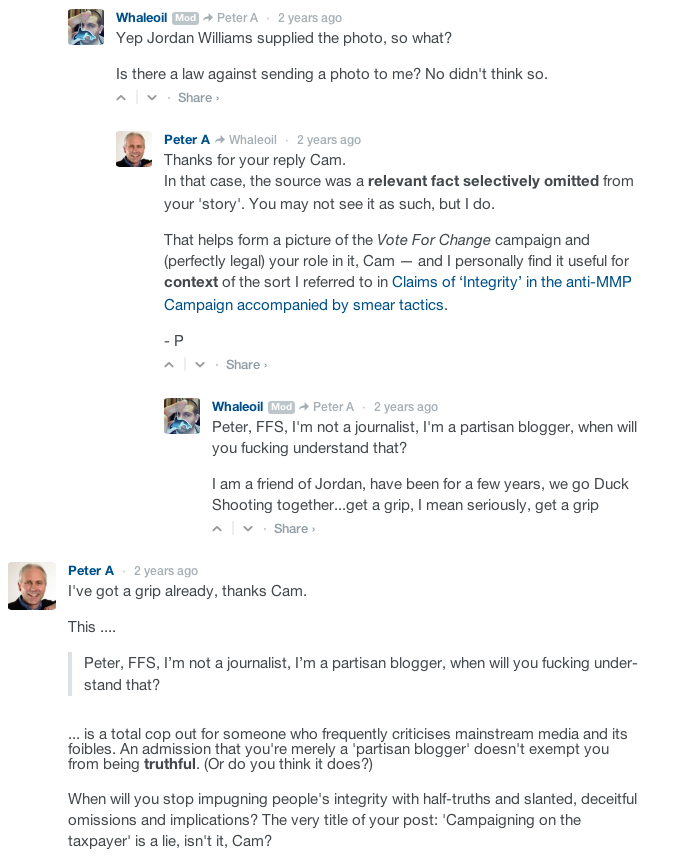
and
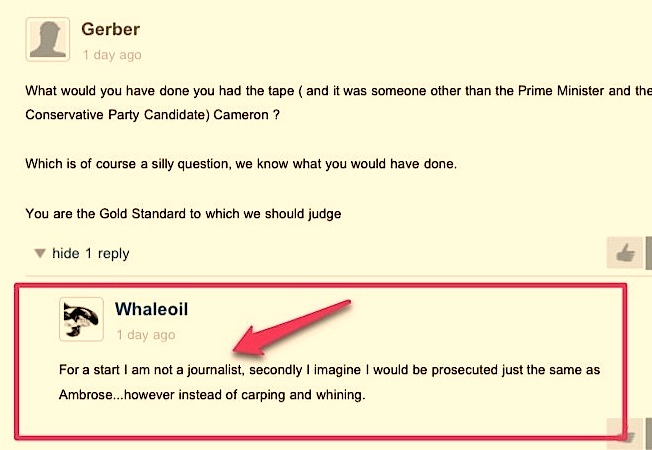
But that was then, this is now. I understand that.
Under pressure, Cameron Slater sometimes gives the appearance of being pretty slippery — and not a straightforward person. Judge Harvey described his unconvincing answers in a police interview regarding his multiple breaches of name suppression orders as ‘naive and evasive‘. Yes, I can understand that too, even if, as in this case, the situation Cameron finds himself in is entirely one of his own making. Cameron seems to fancy that he knows all sorts of amazing secrets and gossip that others don’t know.
There is, it seems to me, good reason to question Cameron Slater’s motivation for his protracted attack on the reputation of the Auckland businessman.
Blog as weapon of personal destruction
One of the striking things that stood out for me in Auckland Mayor Len Brown’s ‘crisis’ interview on TV3’s Campbell Live the day Cameron Slater launched his post-election exposé of the Mayor-elect’s affair, was Brown’s expressed view that there was “an element of political endeavour” around the timing of the revelations. “In my view there is a clear will or determination to try and force a resignation, and in fact destroy me,” he said. (bolding added)
And remember, Cameron’s father, former National Party president John Slater was failed right wing mayoral candidate John Palino’s campaign manager. Palino campaign worker Luigi Wewege was Cameron Slater’s ‘source’ for the Brown scandal. These seem to me to be established facts.
That phrase “destroy me” jumped out at me at the time. It rang true. That seems, to me, to be as good an explanation for Cameron Slater’s motivation as any I’ve considered. I’ve talked before here about how the whale oil attack blog has run a meme of ‘Len Brown is a F***ing c**t’ (see Calling out haters like Cameron Slater). I despise that behaviour.
So it was interesting for me to read a statement by the Auckland businessman who was the ‘target’ of Cameron Slater’s extensive campaign of ‘publication’ — now the subject of defamation proceedings — which in part says (bolding mine):
I have researched defamation law. I have represented myself throughout these proceedings. I couldn’t afford a lawyer so I have had to do it myself. But I make no claim to be a lawyer. Mr Slater is no more a journalist than he is a brain surgeon.
This man embarked on a systematic, planned and relentless campaign to destroy me, not just professionally but personally. He thought he could do this with impunity. He was wrong.
From appearances, it’s pretty hard to argue with any of that, in my view. I archived copies of some of the material Cameron Slater published on his website during that ‘systematic, planned and relentless campaign’. It’s pretty foul stuff to publish, in my opinion, whether it’s true or not. (And I say that as someone who has myself also published some fairly stern criticism of the actions of others, including internet marketers and property spruikers.)
But worse, in my view, was Cameron Slater’s ‘demeanour’ and his abusive attitude in answering commenters on his website, including his ‘target’, and reporting his communications with his target, and some of his name-calling. Just foul. The summary in Judge Blackie’s judgement scratches the surface.
It’s also interesting to note that Cameron Slater admits the defamatory meanings. (Pretty hard to deny them I guess.)
[9] In a revised statement of defence, the defendant would appear, in the main, to admit publication of the material complained of and to admit, in some cases, the defamatory meaning that is pleaded. The affirmative defences are truth and/or honest opinion. In his pleadings, the defendant lists particulars that are relied upon to support the defences.
So, he meant it, it seems. No regrets?
Is a “PR blog” publishing weaponised information to have its ‘sources’ protected?
A very small part of the ‘Is he/isn’t he news media?’ discussion about Cameron Slater has branched into a considering whether, being accused by others of ‘running certain lines for PR companies‘ — although he denies ‘receiving’ payments he ‘demanded’ (?) — if such allegations were actually proven would that change the nascent perception that what the whale oil blog does is ‘journalism’?
Some defenders of What Cameron Slater actually does say that a blog is ‘more like public relations than news media’. Yes, I understand what they mean. But I guess it’s for the Judge (or the High Court, if Cameron Slater does appeal) to decide whether a ‘PR blog’ (or ‘attack blog’, to use my term for it) should be entitled to protect its clients.
On that topic (and what actually prompted me to put down these few thoughts about some of the issues) this morning I listened to the BBC’s reports of the trial of former employees of celebrity cook and author Nigella Lawson … and heard her statement about how her estranged husband has [allegedly] used a ‘PR blog’ in an attempt to ‘destroy’ her reputation — also reported in today’s NZ Herald (my bolding):
In her evidence, Lawson told the court that after the “awful incident at Scott’s”, false allegations of drug use began circulating on a “PR blog”. The allegations on the blog were “dedicated to salvaging Mr Saatchi’s reputation and destroying mine“, Lawson said.
If Ms Lawson’s claims are true, in the event of a defamation action against the “PR blog”, I wonder if a court would consider ‘protecting the source’ of the defamatory statements published by that “PR blog” on the basis that it was ‘news media’?
I hope not.
– P
Facts are stated to the best of my knowledge and commentary is my honest opinion. Corrections or clarifications are always welcome by email. Comments are open, but watch your step.
– Best wishes, Peter Aranyi © 2013 All rights reserved.

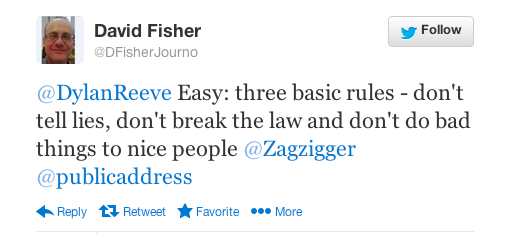

A really good example (and entertaining) of the ‘Damn, I guess we have to admit Cameron Slater is a journalist’ meme is this from the Southland Times:
http://www.stuff.co.nz/southland-times/opinion/9477603/Relatively-speaking
Don’t most journalists require a tertiary level education in order to be considered (or employed as)a journalist? How many journalists in New Zealand – working in the mainstream media – don’t have a relevant qualification?
What is Slater’s highest educational qualification?
Gee, that sounds a bit mean.
Like a lot of vocations, one learns far more by doing the job and from one’s supervisors and mentors. In my own case, my training at Chch Media School (with classmates MIke McRoberts and Barry Guy, still working in the media, and others) was absolutely invaluable, but my various chief reporters, editors and colleagues, and the process of endless correction — lots of chances to ‘rinse and repeat’ — taught me waaay more.
I also found Radio NZ a really good traning ground in those days, committed to upskilling their news staff (particularly senior reporters) on a continual basis. Their willingness to support me (with time off) to do part-time studies to complete my politics degree at Vic was, let’s face it, very generous. Especially when I worked in the Press Gallery.
A lack of a formal qualification doesn’t disqualify (sorry) Cameron from working in ‘news’. We both know he’s a smart guy.
Rather, as I see things, the ‘problem’ is the approach he takes, his pugnacious willingness to repeatedly abuse and insult those he sees as his/his dad’s ‘enemies’ or with whom he disagrees (or who dare to disagree with him) and, as noted, his tendency to use his website as an offensive weapon.
But, hey, that’s just my opinion.
– P
Intelligence != Wisdom as exemplified by Slater
And arrogance is often a side effect of incompetence.
Thanks. I’d seen statements around where Cameron stated explicitly that he wasn’t a journalist. But I didn’t have time to dig them out on my post at TS. I’ll just add a linkage to this as examples.
I’m think that I’m going to be interested enough in the outcome to take some time off work and go and attend this argument when it goes to the high court.
My view is that if Cameron’s way of blogging is “journalism” and therefore the same smear techniques could be used by bloggers and actual journalists, then I want to remove the protection of sources from the evidence act.
Sure that will cause problems with people who actually act as journalists are meant to. That includes people like Nicky Hager and Keith Ng, and even out to the occasional excursions into investigative reporting in the MSM. But it is way too dangerous to allow people to simply call themselves journalists by virtue of a few dollars setting up a site.
It gets too easy to use it to attack others without having to provide corroboration for a source for fantasised material claimed to be “fact”, or deliberate misinterpretation of actual untestable sources. It is better treat them as citizens without special privileges that can be examined transparently.
As the MSM steadily moves into the net, they will feel exactly the same pressures that drive Cameron to invent stories and become jonolists rather than journalists. TV3’s political news seems to be about 2/3rds the way there now.
Thanks for dropping by Lynn, and for your comments. – P
Not sure the word “journalist” is overlwhelmingly relevant to the case though
Well, Jordan Williams used the word ‘journalist‘ or references to it, quite a few times in his (unsuccessful) submission … (click to enlarge)
via John Drinnan:
Nigella Lawson launches legal action against PR boss over Charles Saatchi allegations
(click to enlarge) or read at The Drum website
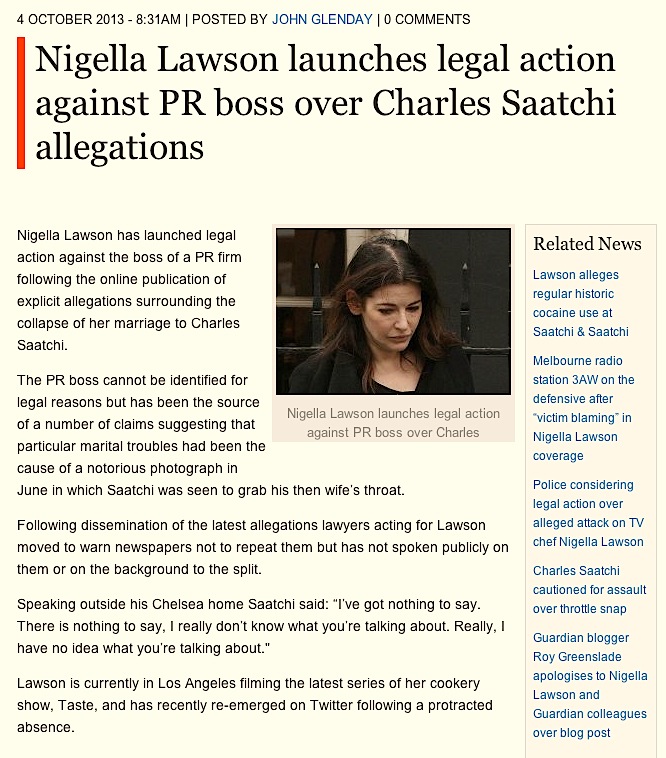
http://www.thedrum.com/news/2013/10/04/nigella-lawson-launches-legal-action-against-pr-boss-over-charles-saatchi
The awful irony in this sentence …
Gawd.
It all seems to me to have rather sinister and disturbing parallels with the penchant of others to now “out” others (cyclists vs motorists etc etc) by using cam-phone footage posted to youtube etc etc. Anything can be made to look as the perpetrator wants it to.
Doctor Goebbels would be proud .. the bigger the lie … the more they believe it.
We have a Government that proves it.
Everyone now is pitching in to build the new industry of “remaking reality into the form we want it to be …” …. its the only growth industry left it seems.
[…] you’re following the issues we discussed in ‘Part of the news media? or a “PR blog” dedicated to “destroying” reputations?‘ there’s a worthwhile post over at The Standard which offers some background and […]
[…] The clash of cultures when professional journalists encounter deliberate loutishness by cynical propagandists can be quite profound, as we discussed in Part of the news media? or a “PR blog” dedicated to “destroying” reputations? […]
[…] My own view of the sideshow that is attack blogger Cameron Slater grasping for ‘news medium’ status (and source protection) for his dreck-filled and [allegedly] defamatory ravings as he tries to fend off accountability for a prolonged and abusive campaign against a failed Auckland businessman hasn’t changed since I wrote this: Part of the news media? or a “PR blog” dedicated to “destroying” reputations?. […]
[…] affairs and blog as dirty, abusive, weaponised PR campaign … which we’ve discussed here a […]
[…] me, that’s redolent of this passage, quoted earlier in Part of the news media? or a “PR blog” dedicated to “destroying” reputations?, from the target of the protracted abusive online reputation attacks by Cameron Slater on his Whale […]
[…] Part of the news media? or a “PR blog” dedicated to “destroying” reputations? and More discussion on the Press Council’s move to ‘embrace’ new […]